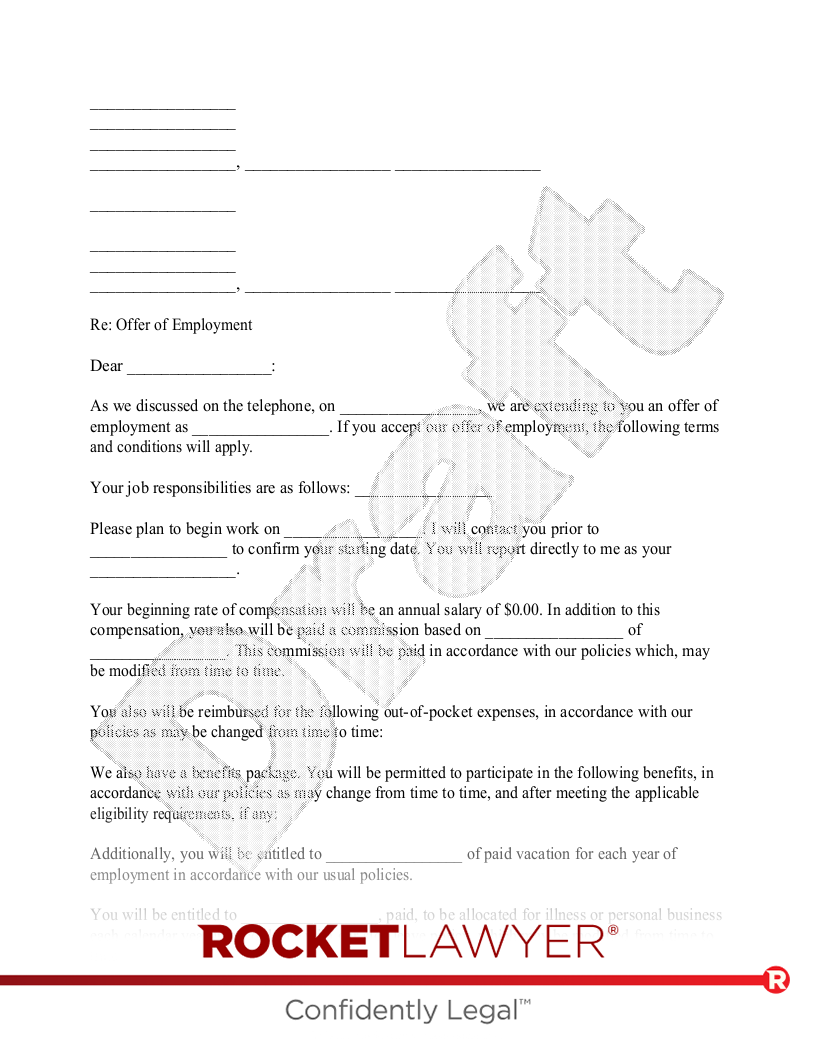How to write an Employment Offer Letter

-
An Employment Offer Letter is normally used by an employer who has verbally discussed the terms and conditions of employment with a potential employee and wants to confirm that discussion in writing. It may come in handy immediately after the final interview and prior to the time that the employee accepts the job offer. If the employee accepts the offer, the employer may want to formalize the employment terms in an Employment Contract.
Here are some issues to keep in mind if you are writing an Employment Offer Letter:
Length of Employment
Depending on state law, an employee may be hired for either a specific term or on an ongoing basis (called an employee-at-will). An employee who is hired for a specific period is entitled to a certain degree of contract rights, and in some instances cannot be dismissed in a manner that is inconsistent with the terms and conditions provided for in the Employment Contract. The employer may want to require the employee to execute a written Employment Contract if the employee will be hired for a specified term.
In contrast, an employee-at-will can be considered a temporary employee. The employment relationship is voluntary, and either the employer or the employee may terminate the existing arrangement at any time for any reason not otherwise prohibited by law (i.e. because of the employee's race or gender). If you intend for the employee to be hired as an employee-at-will, you may want to take all necessary steps to clearly communicate that intention to the employee. If you have any questions about ensuring that the employment relationship will indeed be treated as employment-at-will, ask a lawyer.
Compensation
Wage payments and commission payments to employees must comply with the requirements of the Fair Labor Standards Act, a federal law that sets forth rules regarding wages, working hours, and other employer/employee matters. For example, some types of employees must be paid at least twice per month.
In addition, many states also have laws regulating minimum wage and overtime pay. In some cases, state law is more restrictive than federal law. Because wage and commission laws can vary and change over time, you should consult with an attorney to make sure you are compliant with all applicable laws when it comes to employment matters.
Commissions
"Commissions" are compensation paid to an employee or an independent contractor. The commission is usually an amount calculated as a percentage of the worker's production. For example, a salesperson's commission is often a percentage of the salesperson's sales volume. A commission plan may be in writing and may clearly set forth limitations on the amount of commissions that can be earned, and the circumstances under which commissions will be paid.
Benefits
An Employment Offer Letter may also list benefits to be provided to the employee, including vacation, sick leave, and personal days. You may also want to include language that indicates that the employer benefits may change from time to time.
Expense Reimbursement
Many employers reimburse their employees for various "out-of-pocket" expenses. For example, if the employee is required to use their car to conduct job duties on behalf of the employer, the employer may reimburse the employee by making a fixed "per mile" payment. Other expenses might include long distance phone calls, travel expenses, and education or seminar expenses.
Generally, it is preferable for an employer to retain maximum flexibility by making reimbursement "in accordance with Employer policies in effect from time to time." This allows the employer to change the reimbursement policy. However, you may also want to specify directly in the Employment Offer Letter which expenses will be reimbursed.
Contact
You may wish to specify how the potential employee should contact you to accept the terms of employment. Asking the employee to contact you through some form of written communication (letter, fax, or email) will provide you with proof that the terms outlined in this letter were acceptable to the employee and consistent with the employee's expectations. However, if the employee is being asked to begin work in the immediate future, it may be necessary to have the employee contact you by phone to confirm a starting date.
Ready to make your own Employment Offer Letter? With Rocket Lawyer, it can be as simple as answering a few questions. Get started now!
